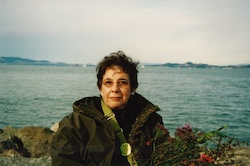

Sheila Michaels Collection Processed Through NHPRC Grant
News item published on: 2024-05-08 10:14:00
 Although Sheila Michaels was a writer by profession, she was also a world traveler, an advocate for women’s rights, and played an active role in civil rights and the 1964 Freedom Summer. Prior to her death in 2017, Michaels donated a collection of her writing and publications, including travel diaries, photographs, and other personal memorabilia to University Libraries Special Collections.
Although Sheila Michaels was a writer by profession, she was also a world traveler, an advocate for women’s rights, and played an active role in civil rights and the 1964 Freedom Summer. Prior to her death in 2017, Michaels donated a collection of her writing and publications, including travel diaries, photographs, and other personal memorabilia to University Libraries Special Collections.
Sheila Michaels was born and raised in St. Louis, Mo., and attended the College of William and Mary. While working on the college newspaper, she was suspended from school for her political and racial opinions. She moved to New York City where she attended Columbia University and created a concentration in mythology and did graduate work in Middle Eastern (Persian and Ancient Civilizations) studies.
In 1961, Sheila Michaels joined the Congress of Racial Equality (CORE) where she worked to bring “Ms.” into prominence as a default form of address for women regardless of their marital status. Michaels worked for the Student Nonviolent Coordinating Committee (SNCC) in Jackson, Miss., as well as in Georgia and Tennessee, and in 1963, she became a SNCC field secretary. She continued her activism by becoming project manager of the Mississippi Council of Federated Organization’s Hattiesburg Project during Freedom Summer in 1964. Michaels was also a part of the first feminist group in New York City, later known as the New York Radical Feminists and was instrumental in the term “feminist” becoming the accepted term in place of “women’s liberationist.”
Michaels spent time in India, Singapore, Japan, and Laos working in public relations, journalism, and editing, and even worked as a cab driver in New York City. She taught Biblical studies to women’s organizations and synagogues.
Through the National Historical Publications and Records Commission (NHPRC) grant, Julia Sumrall, a graduate student in the USM School of Library and Information Science, earning an archive certification, has been working to process this collection. She did the arrangement, descriptions, and created the finding aid. She also created a digital exhibit that can be found on the Special Collections web site.
Of her work on the collection, Sumrall said, “I enjoyed learning about people who worked in the civil rights movement on the ground, that weren’t celebrated. There were so many people who came to Mississippi to help who I had never heard of, but whose contributions were enormous. I also enjoyed learning about Sheila’s life and her struggle for identity.” Sumrall also says she gained a lot of experience working in the archive, learning how to process a collection, including preserving something that can be shared.
The Sheila Michaels collection was selected to be processed with support through a grant from the National Historical Publications and Records Commission (NHPRC). The NHPRC is a statutory body affiliated with the National Archives and Records Administration (NARA) whose mission is promotion of the preservation and use of the country’s documentary heritage essential to understand the nation’s democracy, history, and culture.
Lorraine A. Stuart, Head of Special Collections and Curator of Historical Manuscripts and Archives, is leading the two-year grant project. The purpose of the grant is to increase access to collections and will support processing, digitization, and development of finding aids for existing collections significant to the history and culture of Mississippi. The grant is also providing multiple opportunities for hands-on materials preservation and presentation experiences for the University’s Library and Information Sciences and Humanities graduate students.